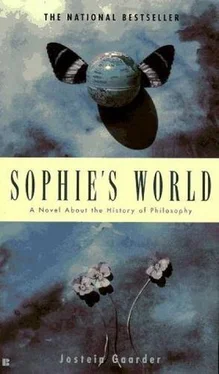Jostein Gaarder - Sophie's World - A Novel About the History of Philosophy
Здесь есть возможность читать онлайн «Jostein Gaarder - Sophie's World - A Novel About the History of Philosophy» весь текст электронной книги совершенно бесплатно (целиком полную версию без сокращений). В некоторых случаях можно слушать аудио, скачать через торрент в формате fb2 и присутствует краткое содержание. ISBN: , Издательство: BERKLEY BOOKS, NEW YORK, Жанр: Философия, на английском языке. Описание произведения, (предисловие) а так же отзывы посетителей доступны на портале библиотеки ЛибКат.
- Название:Sophie's World: A Novel About the History of Philosophy
- Автор:
- Издательство:BERKLEY BOOKS, NEW YORK
- Жанр:
- Год:неизвестен
- ISBN:0-425-15225-1
- Рейтинг книги:4 / 5. Голосов: 1
-
Избранное:Добавить в избранное
- Отзывы:
-
Ваша оценка:
- 80
- 1
- 2
- 3
- 4
- 5
Sophie's World: A Novel About the History of Philosophy: краткое содержание, описание и аннотация
Предлагаем к чтению аннотацию, описание, краткое содержание или предисловие (зависит от того, что написал сам автор книги «Sophie's World: A Novel About the History of Philosophy»). Если вы не нашли необходимую информацию о книге — напишите в комментариях, мы постараемся отыскать её.
Sophie's World: A Novel About the History of Philosophy — читать онлайн бесплатно полную книгу (весь текст) целиком
Ниже представлен текст книги, разбитый по страницам. Система сохранения места последней прочитанной страницы, позволяет с удобством читать онлайн бесплатно книгу «Sophie's World: A Novel About the History of Philosophy», без необходимости каждый раз заново искать на чём Вы остановились. Поставьте закладку, и сможете в любой момент перейти на страницу, на которой закончили чтение.
Интервал:
Закладка:
Later that evening they baked two different kinds of bread. They were going to serve chicken and salad. And sodas. Sophie was worried that some of the boys in her class would bring beer. If there was one thing she was afraid of it was trouble.
As Sophie was going to bed, her mother asked her once again if Alberto was coming to the party.
“Of course he’s coming. He has even promised to do a philosophical trick.”
“A philosophical trick? What kind of trick is that?”
“No idea ... if he were a magician, he would have done a magic trick. He would probably have pulled a white rabbit out of a hat. . .”
“What, again?”
“But since he’s a philosopher, he’s going to do a philosophical trick instead. After all, it is a philosophical garden party. Are you planning to do something too?”
“Actually, I am.”
“A speech?”
“I’m not telling. Good night, Sophie!”
Early the next morning Sophie was woken up by her mother, who came in to say goodbye before she went to work. She gave Sophie a list of last-minute things to buy in town for the garden party.
The minute her mother had left the house, the telephone rang. It was Alberto. He had obviously found out exactly when Sophie was home alone.
“How is your secret coming along?”
“Ssh! Not a word. Don’t even give him the chance to think about it.”
“I think I held his attention yesterday “
“Good.”
“Is the philosophy course finished?”
“That’s why I’m calling. We’re already in our own century. From now on you should be able to orient yourself on your own. The foundations were the most important. But we must nevertheless meet for a short talk about our own time “
“But I have to go to town . . “
“That’s excellent. I said it was our own time we had to talk about.”
“Really?”
“So it would be most practical to meet in town, I mean.”
“Shall I come to your place?”
“No, no, not here Everything’s a mess. I’ve been hunting for hidden microphones.”
“Ah!”
“There’s a cafe that’s just opened at the Main Square. Cafe Pierre. Do you know it?”
“Yes. When shall I be there?”
“Can we meet at twelve?”
“Okay. Bye!”
At a couple of minutes past twelve Sophie walked into Cafe Pierre. It was one of those new fashionable places with little round tables and black chairs, upturned vermouth bottles in dispensers, baguettes, and sandwiches.
The room was small, and the first thing Sophie noticed was that Alberto was not there. A lot of other people were sitting at the round tables, but Sophie saw only that Alberto was not among them.
She was not in the habit of going into cafes on her own. Should she just turn around and leave, and come back later to see if he had arrived?
She ordered a cup of lemon tea at the marble bar and sat down at one of the vacant tables. She stared at the door. People came and went all the time, but there was still no Alberto.
If only she had a newspaper!
As time passed, she started to look around. She got a couple of glances in return. For a moment Sophie felt like a young woman. She was only fifteen, but she could certainly have passed for seventeen—or at least, sixteen and a half.
She wondered what all these people thought about being alive. They looked as though they had simply dropped in, as though they had just sat down here by chance. They were all talking away, gesticulating vehemently, but it didn’t look as though they were talking about anything that mattered.
She suddenly came to think of Kierkegaard, who had said that what characterized the crowd most was their idle chatter. Were all these people living at the aesthetic stage? Or was there something that was existentially important to them?
In one of his early letters to her Alberto had talked about the similarity between children and philosophers. She realized again that she was afraid of becoming an adult. Suppose she too ended up crawling deep down into the fur of the white rabbit that was pulled out of the universe’s top hat!
She kept her eyes on the door. Suddenly Alberto walked in. Although it was midsummer, he was wearing a black beret and a gray hip-length coat of herringbone tweed. He hurried over to her. It felt very strange to meet him in public.
“It’s quarter past twelve!”
“It’s what is known as the academic quarter of an hour. Would you like a snack?”
He sat down and looked into her eyes. Sophie shrugged.
“Sure. A sandwich, maybe.”
Alberto went up to the counter. He soon returned with a cup of coffee and two baguette sandwiches with cheese and ham.
“Was it expensive?”
“A bagatelle, Sophie.”
“Do you have any excuse at all for being late?”
“No. I did it on purpose. I’ll explain why presently.”
He took a few large bites of his sandwich. Then he said:
“Let’s talk about our own century.”
“Has anything of philosophical interest happened?”
“Lots ... movements are going off in all directions We’ll start with one very important direction, and that is existentialism. This is a collective term for several philosophical currents that take man’s existential situation as their point of departure. We generally talk of twentieth-century existential philosophy. Several of these existential philosophers, or existentialists, based their ideas not only on Kierkegaard, but on Hegel and Marx as well.”
“Uh-huh.”
“Another important philosopher who had a great influence on the twentieth century was the German Friedrich Nietzsche, who lived from 1844 to 1900. He, too, reacted against Hegel’s philosophy and the German ‘historicism.’ He proposed life itself as a counterweight to the anemic interest in history and what he called the Christian ‘slave morality.’ He sought to effect a ‘revaluation of all values,’ so that the life force of the strongest should not be hampered by the weak. According to Nietzsche, both Christianity and traditional philosophy had turned away from the real world and pointed toward ‘heaven’ or ‘the world of ideas.’ But what had hitherto been considered the ‘real’ world was in fact a pseudo world. ‘Be true to the world,’ he said. ‘Do not listen to those who offer you supernatural expectations.’ “
“So ... ?”
“A man who was influenced by both Kierkegaard and Nietzsche was the German existential philosopher Martin Heidegger. But we are going to concentrate on the French existentialist Jean-Paul Sartre, who lived from 1905 to 1980. He was the leading light among the existentialists—at least, to the broader public. His existentialism became especially popular in the forties, just after the war. Later on he allied himself with the Marxist movement in France, but he never became a member of any party.”
“Is that why we are meeting in a French cafe?”
“It was not quite accidental, I confess. Sartre himself spent a lot of time in cafes. He met his life-long companion Simone de Beauvoir in a cafe. She was also an existential philosopher.”
“A woman philosopher?”
“That’s right.”
“What a relief that humanity is finally becoming civilized.”
“Nevertheless, many new problems have arisen in our own time.”
“You were going to talk about existentialism.”
“Sartre said that ‘existentialism is humanism.’ By that he meant that the existentialists start from nothing but humanity itself. I might add that the humanism he was referring to took a far bleaker view of the human situation than the humanism we met in the Renaissance.”
“Why was that?”
“Both Kierkegaard and some of this century’s existential philosophers were Christian. But Sartre’s allegiance was to what we might call an atheistic existentialism. His philosophy can be seen as a merciless analysis of the human situation when ‘God is dead.’ The expression ‘God is dead’ came from Nietzsche.”
Читать дальшеИнтервал:
Закладка:
Похожие книги на «Sophie's World: A Novel About the History of Philosophy»
Представляем Вашему вниманию похожие книги на «Sophie's World: A Novel About the History of Philosophy» списком для выбора. Мы отобрали схожую по названию и смыслу литературу в надежде предоставить читателям больше вариантов отыскать новые, интересные, ещё непрочитанные произведения.
Обсуждение, отзывы о книге «Sophie's World: A Novel About the History of Philosophy» и просто собственные мнения читателей. Оставьте ваши комментарии, напишите, что Вы думаете о произведении, его смысле или главных героях. Укажите что конкретно понравилось, а что нет, и почему Вы так считаете.












